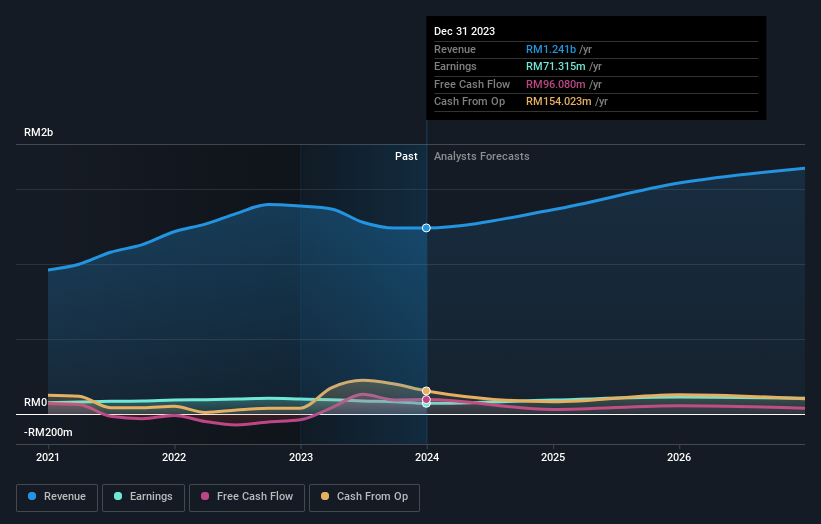Thong Guan Industries Berhad's (KLSE:TGUAN) top owners are private companies with 39% stake, while 35% is held by individual investors
Key Insights
Significant control over Thong Guan Industries Berhad by private companies implies that the general public has more power to influence management and governance-related decisions
51% of the business is held by the top 5 shareholders
Every investor in Thong Guan Industries Berhad (KLSE:TGUAN) should be aware of the most powerful shareholder groups. And the group that holds the biggest piece of the pie are private companies with 39% ownership. In other words, the group stands to gain the most (or lose the most) from their investment into the company.
Meanwhile, individual investors make up 35% of the company’s shareholders.
Let's delve deeper into each type of owner of Thong Guan Industries Berhad, beginning with the chart below.
Check out our latest analysis for Thong Guan Industries Berhad
What Does The Institutional Ownership Tell Us About Thong Guan Industries Berhad?
Institutional investors commonly compare their own returns to the returns of a commonly followed index. So they generally do consider buying larger companies that are included in the relevant benchmark index.
We can see that Thong Guan Industries Berhad does have institutional investors; and they hold a good portion of the company's stock. This suggests some credibility amongst professional investors. But we can't rely on that fact alone since institutions make bad investments sometimes, just like everyone does. When multiple institutions own a stock, there's always a risk that they are in a 'crowded trade'. When such a trade goes wrong, multiple parties may compete to sell stock fast. This risk is higher in a company without a history of growth. You can see Thong Guan Industries Berhad's historic earnings and revenue below, but keep in mind there's always more to the story.
Hedge funds don't have many shares in Thong Guan Industries Berhad. The company's largest shareholder is Foremost Equals Sdn Bhd, with ownership of 37%. With 5.5% and 3.2% of the shares outstanding respectively, Eastspring Investments (Singapore) Limited and Norges Bank Investment Management are the second and third largest shareholders. Additionally, the company's CEO Poon Ang directly holds 1.2% of the total shares outstanding.
On looking further, we found that 51% of the shares are owned by the top 5 shareholders. In other words, these shareholders have a meaningful say in the decisions of the company.
While it makes sense to study institutional ownership data for a company, it also makes sense to study analyst sentiments to know which way the wind is blowing. There are a reasonable number of analysts covering the stock, so it might be useful to find out their aggregate view on the future.
Insider Ownership Of Thong Guan Industries Berhad
The definition of an insider can differ slightly between different countries, but members of the board of directors always count. Company management run the business, but the CEO will answer to the board, even if he or she is a member of it.
Most consider insider ownership a positive because it can indicate the board is well aligned with other shareholders. However, on some occasions too much power is concentrated within this group.
We can report that insiders do own shares in Thong Guan Industries Berhad. As individuals, the insiders collectively own RM41m worth of the RM812m company. This shows at least some alignment, but we usually like to see larger insider holdings. You can click here to see if those insiders have been buying or selling.
General Public Ownership
The general public-- including retail investors -- own 35% stake in the company, and hence can't easily be ignored. While this group can't necessarily call the shots, it can certainly have a real influence on how the company is run.
Private Company Ownership
Our data indicates that Private Companies hold 39%, of the company's shares. It's hard to draw any conclusions from this fact alone, so its worth looking into who owns those private companies. Sometimes insiders or other related parties have an interest in shares in a public company through a separate private company.
Next Steps:
It's always worth thinking about the different groups who own shares in a company. But to understand Thong Guan Industries Berhad better, we need to consider many other factors. For example, we've discovered 2 warning signs for Thong Guan Industries Berhad that you should be aware of before investing here.
Ultimately the future is most important. You can access this free report on analyst forecasts for the company.
NB: Figures in this article are calculated using data from the last twelve months, which refer to the 12-month period ending on the last date of the month the financial statement is dated. This may not be consistent with full year annual report figures.
Have feedback on this article? Concerned about the content? Get in touch with us directly. Alternatively, email editorial-team (at) simplywallst.com.
This article by Simply Wall St is general in nature. We provide commentary based on historical data and analyst forecasts only using an unbiased methodology and our articles are not intended to be financial advice. It does not constitute a recommendation to buy or sell any stock, and does not take account of your objectives, or your financial situation. We aim to bring you long-term focused analysis driven by fundamental data. Note that our analysis may not factor in the latest price-sensitive company announcements or qualitative material. Simply Wall St has no position in any stocks mentioned.

 Yahoo Finance
Yahoo Finance 

